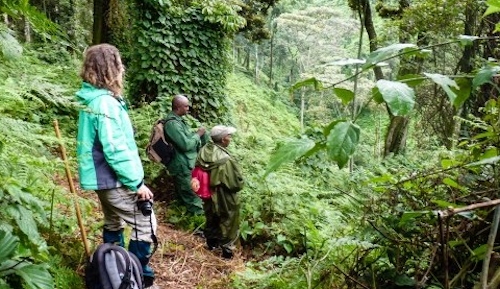As primate watching especially Gorilla Tracking are becoming one of the most-loved-tourist-activity in Africa in particular Uganda and Rwanda, it is very important to also remember that your personal safety is very paramount especially for such an outdoor activity commonly enjoyed by adventurous travelers.
While you read through some of these guidelines we have highlighted in this article, a number of you might get the impression that primate-watching which incorporates gorilla trekking, chimpanzee tracking, or golden-monkey tracking is a very risky and demanding activity, but fortunately that isn’t the case.
The respective authorities in Uganda and Rwanda responsible for wildlife Conservation that is – the Uganda Wildlife Authority and the Rwanda Development Board respectively have come up with the following guidelines which are geared to protect the primates as well as the primates. According experience and past records, it is extremely rare for dangerous wildlife-human accident to happen. During these wildlife encounters you will be accompanied by experienced professional guides as well as armed park-rangers who while ensure that this activity takes place safely.
Generally, Mountain gorillas are gentle peaceful giants that rarely ever show any form of hostility to their visitors. On the other hand, chimpanzees are naturally playful and a bit more aggressive however the good news is that these ones you will visit have been habituated and are familiar with human presence.
Below are the primate-watching guidelines ideal to follow on your safari
Useful Tips when going to tracking, trekking or primate watching
- You are advised to always wear clothes that properly cover your legs as well as arms so as to avoid any scratches from the pricking thorny vegetation and biting insects you will encounter while in the forest.
- Preferably use an insect repellent cream.
- Carry enough drink water so as to keep hydrated because this activity involves walking for a couple of hours.
- Carry a rain jacket/coat as well as a water-proof bag in which to keep your camera. Remember that it can rain any time in these forests.
What to Do while the habitat of the Primates
- At all times follow the instructions given to you by the ranger guide.
- Never visit the primates when your suffering from cough or flu (sneezing) because these animals can easily catch human diseases. In case you get the urge to sneeze or even cough, please look away from the primates
- Once you get the urge to toilet, inform your guide who will dig a hole deep enough for you. Once you have finished easing yourself, please cover the hole properly to prevent these ‘great primate’ from catching diseases from human feces.
- Avoid littering the primates’ habitat and at all times be watchful of where you step.
What to do when in the Presence of Chimpanzees or Gorillas?
- At all times keep the 7 meter distance away from the primates just as your ranger will advise. And in case the gorillas move towards you, at all times gently back away and let them pass.
- Once you observe any form of aggression by the primates, slowly move away.
- Never look directly into the eyes of these primates as it normally threatens them.
- As you record your videos or take photographs, always turn off the flash light of you camera because it also threatens the primates.
- Once you find the primates and you are in their midst, please maintain your voices low and speak softly.
- In case you have to move, always move slowly and avoid rapid movements
- At all times remain together with your fellow trackers as a single group so that the primates are on the other side.
- Never block the primates’ path; always give them right of way.
- Never eat or even drink while in the presence of the primates.
Please follow us on for additional information about primate watching in Uganda and Rwanda and don’t forget to book your safari in Uganda or Rwanda at least 3 months before your desired travel date to ensure that we reserve tracking permits for you.


Comments